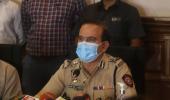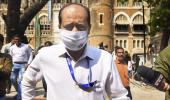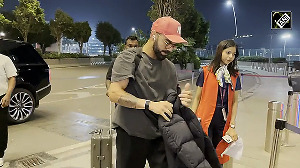'What this incident must do is provide a renewed impetus to urgently bring in police reforms; changes that will ensure that political patronage and extraneous pressure are reduced to a minimum and allow the police to function independently and honestly,' argues Vivek Gumaste.

Former Mumbai police commissioner Param Bir Singh's shocking and sensational allegations against then Maharashtra home minister Anil Deshmukh has set the cat among the pigeons and brings to the fore the complex, precarious and sometimes Faustian nature of the interplay between the political class and the police; a relationship that can swing either way depending on the personalities involved.
Central to a healthy partnership is respect, integrity and a clear understanding of the boundaries that should exist between the two. Violate these tenets and the relationship goes awry with disastrous consequences for society.
The protector becomes the predator, thuggery reigns supreme and lawlessness prevails as suggested by the ugly scandal unraveling in Mumbai.
The sequence of events that led to the open spat between Deshmukh and Singh can be traced back to February 25, when an abandoned Scorpio car with 20 gelatin sticks and a threatening letter was found parked near billionaire Ambani's storeyed south Mumbai home.
A few days later the mystery deepened: Mansukh Hiran, owner of the abandoned vehicle, was found dead in a creek near Thane.
And on March 13, the National Investigation Agency arrested Assistant Police Inspector Sachin Waze in connection with the bomb scare close to Ambani's Antilia residence and Mansukh Hiren's murder.
The case resulted in a major shake-up of the Maharashtra police with Param Bir Singh being shunted out to head the lowly home guards; Deshmukh cited 'serious and unforgivable errors' by officers working in the commissioner's office as the reason.
Singh hit back with a scathing letter to the chief minister charging Deshmukh with allegedly running an extortion racket.
This train of events and the accompanying mudslinging raise several disturbing questions and expose the dangerous fault lines that exist on both sides as well as the unholy nexus between the police and the political class.
Why was Sachin Waze, an encounter specialist with a discreditable police record who had been suspended from the police force in 2004, reinstated after nearly 17 years unless the political dispensation had a nefarious agenda in mind in which such a dubious individual like him could prove useful?
What was the intention in abandoning a car filled explosives near the residence of India's richest man? A possible police hand in such criminal activity is reprehensible and unacceptable.
Why did Singh delay voicing his concerns until after he was shunted out of office?
And were some officers of the Maharashtra police functioning as an extortion mafia under instructions from the home minister?
These are troubling questions and cry out for answers. A high-level impartial inquiry is a must to get to the bottom of this murky episode and to restore the credibility of the Maharashtra police which by all accounts has been a respectable and formidable force so far.
One must admit that if proven, these charges represent the most audacious and blatant attempt at systemic extortion and police criminality witnessed in recent times and something that must make all of us cringe with shame.
However, we will be naive if we were to believe that this is a malady that afflicts the Mumbai police and Maharashtra alone. Such underhand activities to varying degrees are the bane of nearly every state and every police department across the entire country.
So, more important than an enquiry, what this incident must do is provide a renewed impetus to urgently bring in police reforms; changes that will ensure that political patronage and extraneous pressure are reduced to a minimum and allow the police to function independently and honestly.
Political patronage and pressure remain the crux of police dysfunctionality.
Retired Indian Police Service officer Meeran Chadha Borwankar, the first woman officer to head Mumbai's Crime Branch, in a recent interview asserted: 'Police officers should be selected on merit and not on the basis of who is close to the political party in power. In Maharashtra, even the Establishment Board has been breached because of the police-politician nexus. As of today, the DGs and commissioners' post are generally going to those IPS officers who are close the chair (politicians in power).'
The need for police reforms has long been acknowledged. The National Police Commission (1977-1981), the Ribeiro Committee (1998), the Padmanabhiah Committee (200), the Malimath Committee (2202-2003), Police Act Drafting Committee (2005) and Supreme Court Guidelines (2006) -- have all addressed the issue.
What has been missing is a political will to implement the recommendations made by these committees.
In response to a PIL filed by two former DGPs, Prakash Singh and N K Singh, the Supreme Court in 2006 pronounced that police reform was essential and issued seven binding directives to states and Union territories to kickstart the process of reforms.
These seven directives addressed deep seated problems that have bogged the police namely political pressure, lack of accountability, punitive transfers and lack of merit based transparent appointments.
To overcome these deficiencies the top court advocated the setting up of three new institutions at the state level -- State Security Commission to insulate the police from outside pressure, Police Establishment Board to give autonomy to police officers in personnel matters, and Police Complaints Authority to make the police more accountable.
According to the international non-profit Commonwealth Human Rights Initiative, no Indian state or UT has fully complied (external link) with the Supreme Court directives nearly 14 years after they were issued; only Andhra Pradesh and Arunachal Pradesh were partially compliant with five binding directives (two others are not considered within the purview of the states).
To rid the police force across the entire nation of the wrongdoings that have become almost intrinsic to this agency and to prevent a repeat of what transpired in Mumbai, it is imperative that the Supreme Court steps in again to ensure that its 2006 directives are carried out.
The Niti Aayog report titled Building Smart Police in India: Background Into The Needed Police Force Reforms (2017) concluded: 'The needs for a fast-growing economy like India for safe environment particularly in light of the complex security threats in present times are imminent. Terrorism, Left Wing Extremism, crimes including cyber-crimes, law and order issues threats which call for strong and efficient police for internal security.'
'A review of the police governance framework, the legal setup, the issues ailing the police force –all call from making police reforms one of the greatest priority for the country.'
Academic Vivek Gumaste, who is based in the United States, is the author of My India: Musings of a Patriot. You can e-mail the author at gumastev@yahoo.com











 © 2025
© 2025